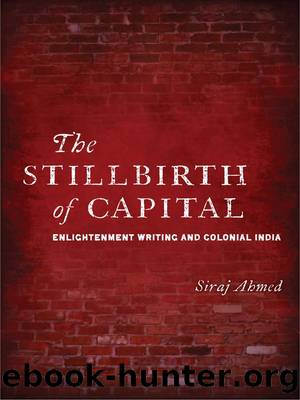The Stillbirth of Capital by Siraj Ahmed

Author:Siraj Ahmed
Language: eng
Format: epub
Publisher: Stanford University Press
Published: 2012-06-15T00:00:00+00:00
Nation/Imitation
Burkeâs allusion to the English breakfast insinuated, in short, that the global economy had compromised the nationâs moral sense. Because he could no longer appeal to that sense, he looked elsewhere for a judgment in the impeachment. Just before describing the torture of the Rangpuri peasants, Burke told the Lords, âYou have had enough, you have had perhaps more than enough, of oppressions upon property and oppressions upon liberty, but here the skin was not touchedâ (6:418). If his recitation of the East India Companyâs crimes against civil society had not moved his audience, Burke implied that the graphic description of physical suffering to follow would. The Philosophical Enquiry into the Sublime and the Beautiful (1757) argued that such images of suffering intrinsically provoke an affective reaction.73 Three decades later, Burke put the theories he had outlined there into practice. Just before the opening speeches, he privately confessed his willingness to be, in his words, âmobbishâ in his attacks on Hastings, dwelling on episodes that, like the torture at Rangpur, would âif anything, work upon the popular Sense.â74 Burke insinuated that because the British public was bereft of a moral sense, he would have to describe the Companyâs crimes in lurid detail, in order to elicit a response from it. He saw the British nation not as a civil society but as a mob, and appealed to it as such: not to its moral sense but rather, in the absence thereof, to its affective reflexes.
Sheridanâs speeches in the impeachment also did not hesitate to âtouch the skin,â working on the popular sense, if anything, only more mobbishly than Burkeâs did. Consider, for example, his account of how peasants responded to the Companyâs alleged devastation of their province in order to finance its army: âThe natives, . . . on the banks of the polluted Ganges, panting for death, . . . tore more widely open the lips of their gaping wounds, to accelerate their dissolution, and while their blood was issuing, presented their ghastly eyes to Heaven, breathing their last and fervent prayer that . . . their blood . . . might . . . rouse the eternal Providence to avenge the wrongs of their country.â75 This passage would be collected, remarkably, in countless nineteenth- and early twentieth-century handbooks of rhetoric, oratory, and elocution. Observers considered another speech Sheridan gave during the impeachment (7 February 1787) to be âthe most eloquent . . . ever delivered in Parliament.â76 Burke called it âthe most astonishing effort of eloquence, argument, and wit, united, of which there was any record or tradition.â Fox exclaimed that âall that he had ever heardâall that he had ever read when compared with it, dwindled into nothing, and vanished like vapour before the sun.â And even Pitt declared that âit surpassed all eloquence of ancient or modern times.â77 Years later, Byron called it the âvery best Oration . . . ever conceived or heard in this country.â78
Yet this speech and the four, almost equally celebrated, that followed in June 1788 offer little to match these claims.
Download
This site does not store any files on its server. We only index and link to content provided by other sites. Please contact the content providers to delete copyright contents if any and email us, we'll remove relevant links or contents immediately.
4 3 2 1: A Novel by Paul Auster(12372)
The handmaid's tale by Margaret Atwood(7755)
Giovanni's Room by James Baldwin(7325)
Asking the Right Questions: A Guide to Critical Thinking by M. Neil Browne & Stuart M. Keeley(5757)
Big Magic: Creative Living Beyond Fear by Elizabeth Gilbert(5754)
Ego Is the Enemy by Ryan Holiday(5413)
The Body: A Guide for Occupants by Bill Bryson(5080)
On Writing A Memoir of the Craft by Stephen King(4931)
Ken Follett - World without end by Ken Follett(4722)
Adulting by Kelly Williams Brown(4565)
Bluets by Maggie Nelson(4547)
Eat That Frog! by Brian Tracy(4525)
Guilty Pleasures by Laurell K Hamilton(4439)
The Poetry of Pablo Neruda by Pablo Neruda(4097)
Alive: The Story of the Andes Survivors by Piers Paul Read(4018)
White Noise - A Novel by Don DeLillo(4001)
Fingerprints of the Gods by Graham Hancock(3991)
The Book of Joy by Dalai Lama(3972)
The Bookshop by Penelope Fitzgerald(3843)
